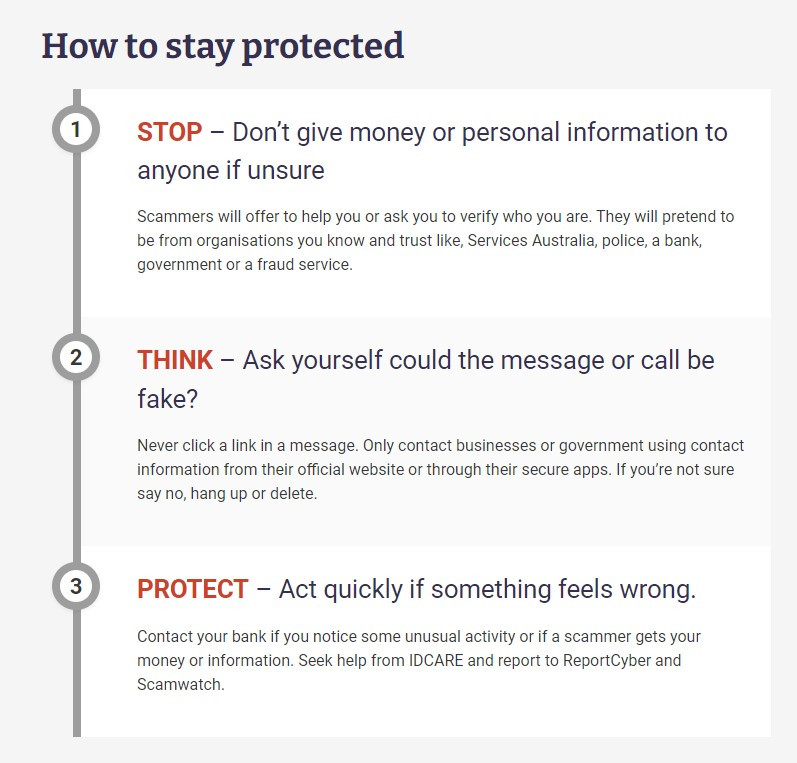Insights & Resources
Your chance to tap into the collective wisdom of the CSCG team, with lively, informative articles that give you opinions and knowledge on a wide range of financial industry issues relevant to you. Always a good read! Full of articles that will inform, energise, and educate. Anything you see that takes your eye, just call us!
CSCG Business Update Help to spot and avoid scams
Common signs that something is a scam and how to stay protected
Scams work because they look like the real thing and scammers contact you when you're not expecting it, or busy trying to do many things at once.
Criminals take advantage of new technology, new products or services and major events. They use them to create believable stories that convince you to give them your money, financial or personal details.
Always stop, think and check before you act. Scammers rely on you not spotting these warning signs because you're in a hurry, you don't want to miss something that looks like a great deal, or because it seems like it's from someone you trust.
Criminals take advantage of new technology, new products or services and major events. They use them to create believable stories that convince you to give them your money, financial or personal details.
Always stop, think and check before you act. Scammers rely on you not spotting these warning signs because you're in a hurry, you don't want to miss something that looks like a great deal, or because it seems like it's from someone you trust.
Who gets scammed?
Everyone is vulnerable to being scammed, no matter who they are. There have been several data breaches over the past year, such as Medibank, Optus and Dymocks, which means your private information may have been stolen and put on the dark web.
This means you have to be extra cautious about emails and text messages you receive to make sure they're real. Unfortunately, people with a vulnerability have experienced record losses in 2022. According to Scamwatch, people with a disability reported financial losses of $33.7 million, 71% more than the year before. Indigenous Australians reported losses of $5.1 million (up 5%) and people from culturally and linguistically diverse communities lost $56 million, up 36%.
The BDO Australian Scam Culture Report shows 47% of the people targeted in scams are over the age of 54 and 25% were over the age of 65.
This means you have to be extra cautious about emails and text messages you receive to make sure they're real. Unfortunately, people with a vulnerability have experienced record losses in 2022. According to Scamwatch, people with a disability reported financial losses of $33.7 million, 71% more than the year before. Indigenous Australians reported losses of $5.1 million (up 5%) and people from culturally and linguistically diverse communities lost $56 million, up 36%.
The BDO Australian Scam Culture Report shows 47% of the people targeted in scams are over the age of 54 and 25% were over the age of 65.
What are the most common ways to be scammed? |
39% of scams are now from text messages, making it the most common way to be scammed. Scams might include the 'Hey Mum' or 'Hey Dad' scams. Then it goes onto say something like "I've changed provider/lost/broken my phone – I'm temporarily using this number for now". When the concerned parent writes back, the scammer keeps pretending to be their child until they ask for money. Other common text message scam are ones that tell you that you've won money or ones that say you need to pay a toll or fine immediately.
Other ways people can scam you are through email, phone calls and social media. Combined, these account for 81% of reported scams. Every unexpected text message or call should be handled with caution.
The most common scams are investment scams which represent a whopping 70% of scam types. Other scams include remote access scams where a scammer tricks you into using your device remotely, fake classified ads, health and medical products like fake cures for ailments and romance or dating scams. It shows how important it is to be wary of where we place our hard-earned cash.
Other ways people can scam you are through email, phone calls and social media. Combined, these account for 81% of reported scams. Every unexpected text message or call should be handled with caution.
The most common scams are investment scams which represent a whopping 70% of scam types. Other scams include remote access scams where a scammer tricks you into using your device remotely, fake classified ads, health and medical products like fake cures for ailments and romance or dating scams. It shows how important it is to be wary of where we place our hard-earned cash.
What are some signs of a scam?
Scams can be hard to spot, but here are some tips from Scamwatch.
- Is it an amazing opportunity to make money? Scammers offer deals that seem too good to be true.
- Does someone you haven't met need money? Scammers often use heartbreaking stories to use your good nature against you.
- The text message or email contains a link or attachment. Scammers often try to send you to a fake website to steal your money.
- You feel pressured to act quickly. Scammers often try to rush you and tell you if you don't act now, you won't get the deal.
- They want to pay you in a strange way. Scammers often ask to pay you with things like a preloaded debit card, an iTunes card and virtual currencies like Bitcoin.
- They ask you to set up a new PayID or bank account. When you're asked to do this, it's a clear sign you need to suspect a scammer.
Stay Informed
When you subscribe to the blog, we will send you an e-mail when there are new updates on the site so you wouldn't miss them.



